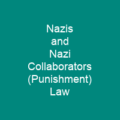The Nuremberg trials were a series of military tribunals held after World War II by the Allied forces. The trials were most notable for the prosecution of prominent members of the political, military, judicial, and economic leadership of Nazi Germany. Their decisions marked a turning point between classical and contemporary international law. For the first time in international law, the Nuremburg indictments also mention genocide.
About Nuremberg trials in brief

government-in-exile in response to the German invasion of their country in 1940. In April 1940, a joint declaration was issued by the UK, France, and the United States that the Allies would pursue the Nazis to the uttermost ends of the earth so that justice may be done. In late 1943, during the Tripartite Dinner Meeting at the Tehran Conference, the Soviet leader, Joseph Stalin, proposed executing 50,000–100,000 German staff officers. The British Prime Minister, Winston Churchill, had then advocated a policy of summary execution in some circumstances, with the use of an Act of Attainder to circumvent legal obstacles, being dissuaded from this only by talks with US and Soviet leaders later in the war. In December 1944, the British War Cabinet discussed their policy for the punishment of the leading Nazis if captured. Churchill believed that perhaps 49,000 soldiers who fought for the country would do better than partake in any such action. However, he also stated that war criminals must pay for their crimes and that, under the Moscow Document, they should be tried at the places where the crimes were committed. According to the minutes of a meeting between Roosevelt and Stalin, Churchill was very much struck by the extent of the German destruction in Crimea and therefore was more bloodthirsty under the Nazis’ rule. In February 1945, at the Yalta Conference, Roosevelt joked that he would rather be shot in the courtyard of the Livadia Palace rather than in any other place.
You want to know more about Nuremberg trials?
This page is based on the article Nuremberg trials published in Wikipedia (as of Dec. 06, 2020) and was automatically summarized using artificial intelligence.







